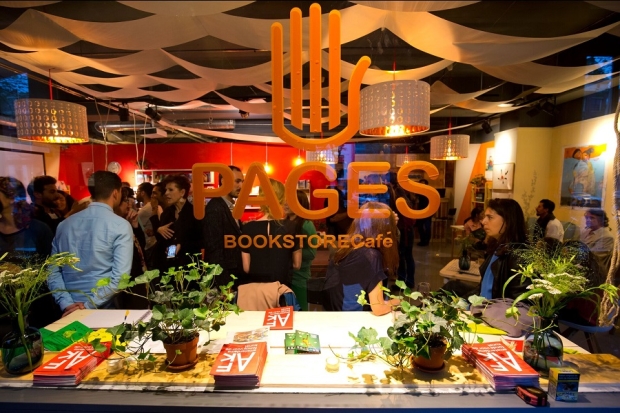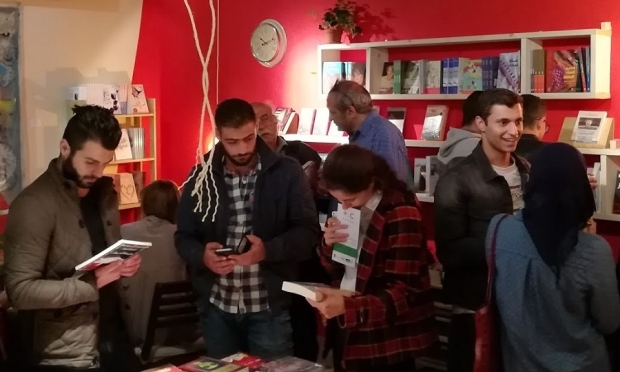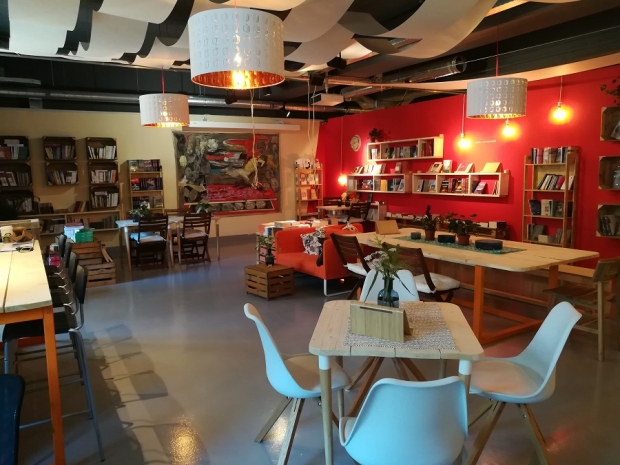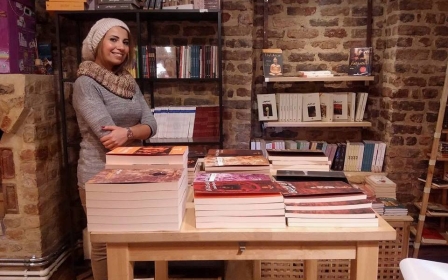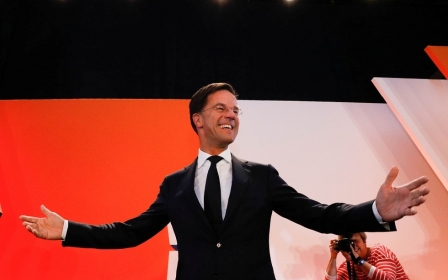Syrian refugee turns page on war with Holland’s only Arabic bookstore
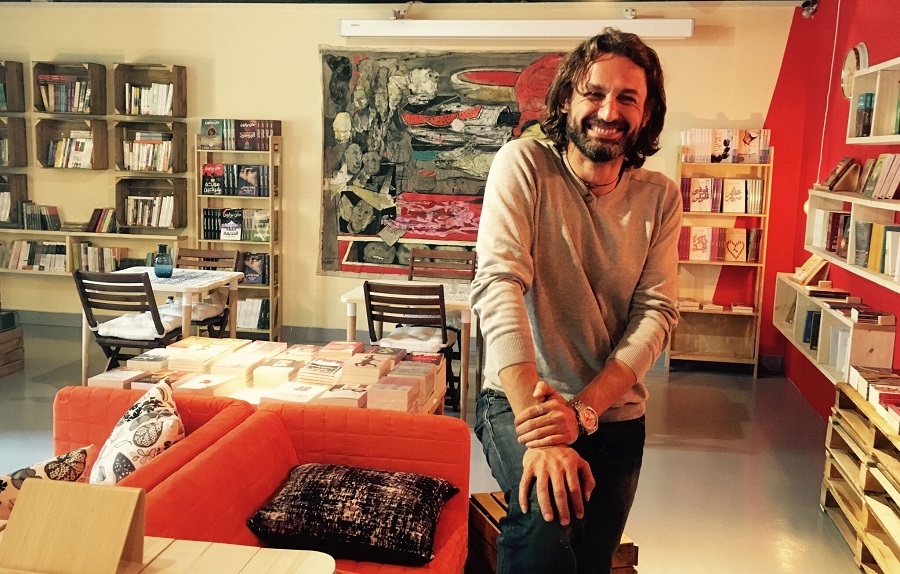
AMSTERDAM - Back when Samer al-Kadri ran a publishing house producing children’s books in Damascus, he dreamt of opening a cultural centre, but it was only when he was forced to flee his homeland that he established one.
After opening Pages, a successful bookshop and cultural centre in Istanbul, Kadri has now gone on to inaugurate a second branch in Amsterdam that opened its doors this month.
But it is not just about books – Kadri hopes the space will foster understanding between the 64,000 Syrians living in the Netherlands and their hosts. “Don't judge each other before we know each other,” is his mantra.
The orange walls are lined with bookshelves containing hundreds of titles in Arabic, and a smattering of Turkish and English books. Unframed pieces of art from Syrian artists such as Houssam Alloum and Omran Younes adorn the walls. There is a small bar where you can serve yourself a cup of tea and comfortable chairs to sink into with whatever book you have picked up.
'Don't judge each other before [you] know each other'
- Samer al-Kadri, owner of Pages
It is a future he could not have imagined when he visited the Abu Dhabi book fair back in 2012. While he was promoting his books, his publishing house in Damascus, Bright Fingers, was being raided by the Syrian authorities, who accused him of supporting terrorist activities. “I realised there was no way I could go home,” he said. Forced to flee, he relocated to Istanbul. "The publishing house is now completely destroyed," he said, “because of [Syrian president Bashar al] Assad.”
Bright Fingers grew out of his love for creating work for children. As a graphic designer, he was involved in the first Arabic TV channel for children, Space-Toon. In 2005, he decided to open a publishing house dedicated to children’s books. “I wanted to spread real literature for children and true humane values because beyond our superficial differences that are made up by the environment or the way we were raised, deep down we are all the same.”
Undefeated, he and his wife Gulnar Hajo opened Pages in Istanbul in 2015. He has since received refugee status in the Netherlands, and is waiting for his wife and their two daughters to join him. For now, Hajo and a handful of employees keep the Pages in Istanbul running, and he hopes the community will take over. “I am always telling people in Istanbul: you should take care [of it] because it is your place, not my place.”
Batool Lakmoush, 25, browsed through a pile of fiction that included Arabic translations of Nikos Kazantzakis’ classic Zorba the Greek and Elizabeth Gilbert’s Eat Pray Love. “I have friends who are refugees in Turkey, and they are always posting [on Facebook] about events at the Pages there,” she said smiling. “Finally we have an Arabic place here,” Lakmoush added.
'I feel like it’s a small Syria, it reminds me of home'
- Batool Lakmoush, architecture student
Lakmoush arrived in the Netherlands seven months ago, carrying just a single volume with her: Palestinian poet Mahmoud Darwish’s The Butterfly Burden, in which he eloquently muses on exile. Now she was looking to add to her collection. “It’s such a joy to be able to read Arabic from paper,” the architecture student said, as most of her Arabic reading has been largely confined to the screen of her mobile or laptop.
Most of all, Lakmoush was excited about what the bookstore represents. “I miss my culture, my country,” she said. The cafe reminded her of similar cultural cafes in Syria. “I feel like it’s a small Syria, it reminds me of home.”
Visitors happily struck up conversations with strangers - it was an opportunity to meet and engage. Adnan al-Mahmoud, a 57-year-old agricultural engineer from Damascus, has found it difficult to meet people at the public library he frequents in Rotterdam.
“For me, this is an important place to make contact with Arabic-speaking and Syrian people,” he said in Dutch, which he has learned since his arrival two years ago. Back in Syria, Mahmoud’s house had a large library, filled with philosophical works by authors such as Khalil Gibran. Yet he had to leave it all behind. “Now I hope to build a library here too,” he said.
Some visitors are not interested in books at all. “You can buy most Arabic books online now,” said 47-year-old Taleb Ibrahim, a Syrian writer who fled to the Netherlands eight years ago. Ibrahim is happier about fellow Syrians having a place to come together and discuss the crisis affecting their country. “Here we can discuss the background of the war. It’s not possible to talk openly in Syria,” he said.
New generation
Kadri hopes to stimulate such discussion and reflection by publishing young authors from the region. “What we need is a new generation with more hope for a better future.”
Recently published titles include Life Inside the Cave, in which novelist Mansour Mansour reflects on the time he spent in Syria’s prisons, and Whispers of the Revolution in Syria, a book of poetry by Wafa’a al-Layla.
'Here we can discuss the background of the war, it’s not possible to talk openly in Syria'
-Taleb Ibrahim, Syrian writer
For Kadri, art and culture will play a crucial role in the eventual rebuilding of his country. “We need builders to build houses, we need farmers, we need medicine, we need food - we need many things, but we also need art and culture. Without culture, we don’t have anything.”
During the opening, 35-year-old Dania watched over her two-year-old daughter, who enthusiastically embraced a stuffed animal from the box, while her four-year-old leafed through an Arabic version of Cinderella.
“She can’t read yet, but she enjoys the pictures,” she said. The family is still settling in after arriving only a month ago. Dania had not ever given thought to where she would be able to buy books for her children, but she will be coming back to Pages. “I would hope that they will be able to read Arabic, it’s important they won’t forget their culture,” she said.
Labour of love
Pages fills a gap left when the Arabic bookstore El Hizjra Amsterdam shut after three decades in March 2013 after losing its Ministry of Education subsidy and failing to attract enough customers. Since then the number of Arabic readers in the city has grown significantly with the new influx of Syrian refugees.
For Kadri, the Pages bookstores are a labour of love, rather than a business project. “For me it would be better financially to just close. I lose money every month,” Kadri said of the Istanbul store. He has to import books from across the Arab world and most customers come to read, or borrow books rather than buy.
Kadri's favourite memory does not entail a successful month of sales, or a book presentation. It is of an old man who visited a music night at the Istanbul Pages with his wife. Afterwards, he thanked Kadri for creating the space. “It really makes us feel at home, and took us back to Syria. It made us remember Syria," the man said. And that is what matters to Kadri. “I want the space to be a home… we present books, art, music and a lot of love,” he said.
'We need builders to build houses, we need farmers, we need medicine, we need food - we need many things, but we also need art and culture. Without culture, we don’t have anything'
- Samer al-Kadri, owner of Pages
The Amsterdam branch is off to a steady start due to a helping hand from the Prince Claus Fund, the Lutfia Rabbani Fund and the Amsterdam Fund for Art. For the time being, the lobby of the Prince Claus Fund, which is one of the sponsors for the Istanbul Pages, has transformed into the Pages bookstore.
When Kadri said he was looking for a space to open a Pages bookstore in the Netherlands, the fund immediately offered him the lobby of its building - a prime location on a stately Amsterdam canal. In five months' time, the store will relocate elsewhere in the Dutch capital and Kadri is still busy scouting a location.
Kadri has issued an open invitation to anyone wanting to organise events, readings or show their art. “Pages is not just a place for Syrians, but it’s a place for everyone,” he said. There are 15 nationalities that frequent the bookstore in Istanbul, and he hopes to achieve similar diversity in Amsterdam.
After the summer, he plans to open a Pages in Berlin, and has been invited to explore the opening of a branch in Canada as well. The one place he would most like to open a similar venture is back home in Damascus. “My dream is to do this in Syria, soon,” he paused. “As soon as possible."
Middle East Eye propose une couverture et une analyse indépendantes et incomparables du Moyen-Orient, de l’Afrique du Nord et d’autres régions du monde. Pour en savoir plus sur la reprise de ce contenu et les frais qui s’appliquent, veuillez remplir ce formulaire [en anglais]. Pour en savoir plus sur MEE, cliquez ici [en anglais].


